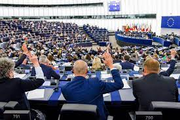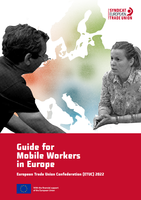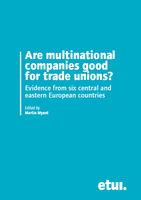 |
| Download pdf file | Newsletter archives |
| Dieser Newsletter auf Deutsch | Cette newsletter en français |
1. Draft proposal for new EWC Directive later this year |
 |
|
Large majority in the European Parliament
The motion received strong support from Christian Democrats, Social Democrats, Greens, Liberals and the EU-critical group to which the Polish ruling party PiS belongs; a relatively large number of votes against came from the extreme right and the Left group. The debate had already taken place in Strasbourg on 19 January 2023, with 27 MEPs taking part. The vast majority supported the motion, however a liberal party member from Bulgaria as well as Christian Democrats from Sweden and Slovakia are against the provisions for fines or injunction. The gender quota for EWC mandates is also controversial. The far-right Rassemblement National party from France speaks of an "infernal European machine" and "technocratic gimmicks". The right-wing Vox party from Spain views it as a threat to free enterprise. The Hungarian ruling party Fidesz is against any changes to the directive. The far-right Lega from Italy would like sanctions for violations of the directive to be defined by national law rather than by Brussels. The far-right AfD from Germany wants to strengthen local works councils so that they can fight the Green Deal and the creation of sustainable jobs.
Video of the debate in the plenary session
The next steps
The European Parliament can call for a legislative procedure, but cannot impose it. This remains a prerogative of the European Commission. It decided on 1 March 2023 that a draft should be finalised and the legislative procedure started before the end of the year. The social partners are to be consulted at European level beforehand. If trade unions and employers' organisations are able to reach a common agreement, this could be enacted as a new EWC directive. In summer 2008, joint draft proposals from the social partners had paved the way for the adoption of the amendments which were made at the time to the directive, but only after the European Commission had started the legislative process (see report in EWC News 3/2008).
Press report on the European Commission announcement
Forthcoming Event
The current status of the revision procedure will be discussed at the next EWC conference on 29 and 30 January 2024 in Hamburg. The program will be available after the summer break. |
2. Developments at European level |
 |
|
New rules on corporate sustainability reporting
Explanation by the European Commission Overview of Directive contents Legal action against the Adequate Minimum Wage Directive
While trade unions in most EU countries have been calling for the directive for a long time, a statutory minimum wage is not necessary in the Scandinavian countries because collective bargaining coverage and trade union membership are very high. In April 2020, trade unions from Denmark, Sweden, Norway and Iceland approached the European Commission and warned of its negative consequences (see report in EWC News 3/2020). They fear a loss of membership if all workers, even those who do not belong to a trade union, benefit from minimum wage provisions. The Swedish trade union confederation LO temporarily stopped paying contributions to the European Trade Union Confederation in protest (see report in EWC News 1/2022).
The Social Democrat-led government in Denmark shares the criticism voiced by the trade unions. In contrast, the new conservative government in Sweden does not support the legal action. In December 2021, the previous Social Democratic government had also abandoned its outright rejection of the directive. The red-green government in Finland has welcomed the directive from the start. In Norway and Iceland, EU directives on labour law must be transposed provided that they are necessary for the functioning of the internal market. The Norwegian government and the European Commission do not see this as being the case and as a consequence the directive will not be transposed in Norway and Iceland.
Report on the positions in Denmark and Sweden Reflections on collective bargaining in Scandinavia Social dialogue to be reinforced
To achieve this goal, the capacity of social partners needs to be reinforced so that they can conduct collective bargaining on a large scale. Weak trade unions in Central and Eastern Europe would have to be made capable of acting through state support, as has been the practice in France and Spain for many years. The European Commission wants to provide support through a pan-European research network.
Social Dialogue at European level, which was institutionalised within the Maastricht Treaty in 1992, should also be strengthened. Trade unions, employers' associations and the European Commission regularly exchange views on social policy issues. In this way, the social partners become involved in the EU legislative process. In June 2020, for example, European Social Dialogue produced a framework agreement on digitalisation (see report in EWC News 3/2020).
Communication from the European Commission Press release from European trade unions Database of Social Dialogue documents |
3. Evaluation of works council elections in Germany |
 |
|
Falling turnout at elections in large companies
The 2022 works council elections were marked by the effects of the Corona pandemic and new legal rules that have been in force since June 2021 (see report in EWC News 2/2021). Home office and postal voting posed a special challenge in the preparation and organisation of the elections as well as for electorate mobilisation. But the trend towards the decline in interest started earlier. Voter turnout has actually been declining from 80% (2014) to 76% (2018) to 72% (2022), especially in large companies with more than 1,000 employees, where lists of candidates rather than individuals can stand for election.
Women continue to hold 30% of all mandates, and this proportion is only higher in the service sectors where it is almost half. 38% of all representatives were elected to the works council for the first time. In 8.3% of all cases the works council was established completely from scratch, which does not always run smoothly (see report in EWC News 3/2020). In these cases, a high proportion of very young employee representatives can be observed.
Examples of election results in the chemical industry
Employer-friendly Institute makes assessment of trade union strength
On 29 December 2022, the Institute of German Business presented its own analysis based on a non-representative survey of 750 companies. Their figures differ somewhat from those evaluated by trade union analysis, but the trends are the same. According to their analysis, not only voter turnout is falling, but also the influence of trade unions. Today only four out of ten works council members belong to a trade union (39% DGB and 1% non-DGB unions), with 50% in manufacturing and 12% in services. In every second company there are no unionised works council members (any more). Seven out of ten works council chairpersons were re-elected for a further term of office. They are typically 50 years old and have been employed in the company for 23 years. 17% of all chairpersons have a university degree. The union density in Germany is 17.4%, higher in the West than in the East, higher in manufacturing than in services. This shows that the workforce is much more likely to vote for unions than to join them.
|
4. Recent developments in EWC law |
 |
|
EWC establishment still possible in England after Brexit
The application to establish an EWC had already been made in July 2015 from two countries. However, central management did not want an EWC, arguing: "given the decentralized nature of our businesses, and we have no transnational issues which bind us together, what will we talk about in an EWC meeting, and what will the agenda be?" Subsequent to an initial complaint filed by the Unite union before the CAC, central management had promised in March 2017 to establish a Special Negotiating Body. However, this did not come about because the people in charge had changed several times, both at the company and at the trade union. Finally, central management wanted to completely cancel the establishment of the EWC, on the grounds of the forthcoming Brexit. The CAC has now decided that an EWC must be established by 30 June 2023 on the basis of the subsidiary requirements.
Further consultation in the Irish Parliamentary Committee
Since May 2022, the European Commission has been pursuing infringement proceedings against the Republic of Ireland on these grounds (see report in EWC News 2/2022). After Brexit, the country has become the preferred destination of corporations from the USA and Switzerland, which had previously used British law, but also of British companies. As a result, Ireland now ranks third (for the number of EWCs) in the EU after Germany and France (see report in EWC News 1/2021).
Video of the committee meeting (from min 10, contribution by Werner Altmeyer from min 23) Written minutes of the committee meeting EWC expenses abroad come before the Federal Labour Court in Germany
The Lower Saxony Regional Labour Court gave leave to an appeal before the Federal Labour Court. The fundamental question reaches far beyond this specific case. If, in addition to central management abroad, a German subsidiary were also jointly and severally liable, European works councils would be able to take legal action in the jurisdiction of their choice. This would consequently create a "level playing field" vis-à-vis multinational companies, which frequently choose the jurisdiction which best suits them.
Vienna Court of Appeal upholds EWC ruling
The central management of Mayr-Melnhof is refusing to pay for experts and lawyers as a matter of principle, because in Austria a local works council pays for its lawyers itself. As in France, it has its own budget for this purpose, the so-called "works council levy". However, this principle does not work for the European works council in Austria because it does not have its own budget. On 23 February 2023, the Higher Regional Court of Vienna confirmed the decision of the Labour and Social Court of First Instance in Vienna of March 2022, according to which the central management must reimburse these costs (see report in EWC News 1/2022). An appeal against this ruling is possible to the Supreme Court, as there is no case law on EWCs in Austria so far.
This question had also occupied courts in Britain, where there is no historical experience of works councils. The Employment Appeal Tribunal London made the landmark decision in October 2020 that such costs are part of the EWC's necessary means and fined the central management of the US telecommunications group Verizon for not paying the EWC's lawyer (see report in EWC News 3/2020). |
5. Court rulings on fundamental issues |
 |
|
Works council members are entitled to attend seminars in person
The works council argued before the court that the quality of a webinar could not be compared with a face-to-face event. Questions, exchanges and discussions "are possible to a much more limited extent than during a face-to-face event". Online training has more of a "classical lecture format" and a face-to-face seminar has a greater learning effect. According to the court, this reasoning is "unobjectionable". The issue has considerable significance for German works councils, but also for European works councils. With the Corona pandemic, digital formats have become part of works council work on a broad front (see report in EWC News 3/2022).
Temporary agency workers to receive same "overall protection" as permanent employees
The case originated in Würzburg (Bavaria), where a retail warehouse temporary worker earned one third less per hour than her permanent colleagues. The Federal Labour Court referred the case to the European Court of Justice, just as the Kaiserslautern local Labour Court in a comparable case (see report in EWC News 2/2020). Now the Federal Labour Court must clarify how these compensatory benefits are to be quantified, i.e. how much additional pay the plaintiff will be paid. In the future, courts can declare a collective agreement invalid if it does not protect temporary workers from worse working conditions, because the EU Directive on Temporary Agency Work lays down the principle of equal treatment. This is common practice in other countries: for example, temporary workers in Poland and Belgium earn the same as permanent staff, and in France they even receive a 10% bonus.
Critical analysis of the situation Compensation for pay discrimination
Federal Labour Court press release |
6. Newly established European Works Councils |
 |
|
US automotive supplier establishes EWC under German law
Plenary meetings are held once a year. The ten members of the select committee (one per country) will be informed by central management every quarter, by video conference, unless otherwise agreed. The EWC may call in experts for up to three days of consultancy per year, under the condition that "the necessary expertise cannot be obtained at a lower cost than by commissioning the selected expert". All communications from the EWC to the workforce and local works councils must be previously agreed between management and EWC. In the event of disputes, a conciliation body is provided for ("Joint Committee"). All other features largely conform to the subsidiary requirements of the EU Directive. However, there is one article that is unlikely to be compatible with EU law: namely, the termination of the EWC agreement leading automatically to the dissolution of the EWC. In France this was prohibited by the courts in a comparable case (see report in EWC News 4/2021). French payment service provider with exemplary provisions
The EWC is competent for all cross-border matters that go beyond the decision-making authority of subsidiaries. It must be involved before any information is shared within the company. The annual consultation on the Worldline annual report is very short, as each individual project goes through its own consultation procedure, which lasts up to two months and ends with an opinion from the EWC. The prerequisite is that it has received sufficient information to fully understand the project. At all stages, this information can be shared with national employee representatives unless it is explicitly classified as confidential for a limited period of time.
Involvement for major reorganisations is described in great detail and the EWC receives extensive expert support: 20 days consultancy per year and an additional 30 days for each project. The expert's report is submitted to both sides, however the expert is not allowed to attend EWC meetings, only preparatory meetings of the employee side. EWC members have 120 hours of time-off work per year in addition to the time for attending meetings, substitute members 60 hours. In addition, there are 16 days of training during the four-year term of office.
The five members of the select committee meet in person. Extraordinary meetings can also be hybrid (a combination of online and face-to-face) if both sides agree. As provided for in French legislation, the EWC can nominate one member of the Administrative Board (see report in EWC News 4/2022). Worldline has been an independent company since May 2019. It was previously a subsidiary of Atos and was represented by their SE Works Council (see report in EWC News 1/2022).
Interview with the HR manager on the establishment of the EWC US pharmaceutics group establishes EWC under Irish law
Initially, the members of the special negotiating body will act as provisional EWC members. A new election will not take place for about a year, once the sites of the acquired company Pall Life Sciences have been integrated. The EWC holds two annual face-to-face meetings and the five members of the select committee meet central management four times a year, including at least once in a meeting held in person. In addition, extraordinary meetings are held when a planned restructuring affects 3% of the European workforce or 100 employees in two countries. The consultation procedure is described in detail, and the EWC must render its opinion no later than 14 days after receiving all information. Cytiva's central management wants to discourage the EWC from litigation and explicitly declines to pay legal fees in the agreement. This passage is almost certainly in breach of EU law. |
7. Revised EWC agreements |
 |
|
French waste and water services provider downsizes EWC
A special negotiating body was therefore established, which signed a new EWC agreement on 22 November 2022 at the company headquarters in La Défence near Paris. The EWC will be reduced from 27 to 15 members but will retain features from the past. Plenary meetings will continue to be held every six months, chaired by the employer, and two representatives of the European trade union federations can attend as guests. The EWC board consists of four representatives (previously eleven) who meet every two months. The EWC can use a consultancy firm and has a budget of €40,000 a year, in addition to the running costs of meetings. The divisional working groups on water and waste are dissolved and two working groups remain in place: on occupational health and safety and on various current issues. The working groups consist of ten members each from the EWC and management and meet twice a year.
There are generous time-off work provisions without exactly defined hourly limits, which is unusual by French standards. Each EWC member is entitled to at least three days of training per year and access to all European subsidiaries. Travel and interpretation expenses are covered for 15 business trips per year. If central management takes a decision that affects only one country outside France, it is considered as a cross-border matter and the EWC is involved. The 5,000 UK employees continue to be represented on the EWC. There is also provision for the EWC to receive information on Suez's global strategy. US company excludes British delegates
Exceptional circumstances are when at least two countries and more than 70 employees per country are affected. The EWC has to render its opinion within one week of extraordinary meetings. It may appoint experts of its own choice to attend meetings with the employer on specific issues. An annual budget of €15,000 is set aside for this purpose, which can be carried over into subsequent years. Regular EWC meetings last three days, extraordinary 1.5 days including internal pre- and post-meetings. In addition to the meetings, each delegate has an annual time-off work allowance of 75 to 600 hours, depending on function.
There had been a legal dispute at IBM over the obligation of confidentiality. The Spanish Supreme Court ruled in October 2020 that EWC members could share plans on workforce downsizing with local works councils. Because this is not a breach of confidentiality, disciplinary measures are excluded (see report in EWC News 4/2020). The new EWC agreement has taken the ruling into account. |
8. Examples of failed negotiations |
 |
|
First EWC without agreement in Spain
First company in Denmark without an EWC agreement
For Denmark, which is characterised by social partnership, this situation is an absolute first, as all other 26 European works councils in the Kingdom have an EWC agreement. This is also unusual for other countries. There are only 23 other companies in the whole of Europe whose EWCs operate without an agreement according to subsidiary requirements. They are disproportionately affected by legal disputes because there is often a lack of agreement between employee representatives and central management on the role of the European works council. Such examples are mostly found in US companies such as Verizon, Oracle or HP Inc. (see report in EWC News 4/2020). German plastics manufacturer without SE participation agreement
In the Wirthwein Group, not only was the workforce excluded from the supervisory board, but no agreement could be reached on the rights of the SE works council. It therefore operates on the basis of the SE Directive´s standard rules and has the same composition as the special negotiating body previously: Germany eight seats, Poland two and Spain one. There had never been an EWC before. The failure of such negotiations is very rare and indicates the tough stance taken by management. In Germany, representing about 85% of all SE conversions in Europe, there are only a few comparable cases (see report in EWC News 3/2020). In France, the only other EU country with a significant number of SE conversions, only one case has been reported (see report in EWC News 4/2022).
Press release on SE conversion |
9. The view beyond Europe |
 |
|
Call center world leader reinforces social responsibility
The agreement goes beyond legal requirements in certain countries, with improvements expected in Poland, El Salvador, Colombia, Romania and Jamaica notably. In case of disagreements, the matter is referred to a neutral mediator. The final step is a legally binding decision under the International Labour Arbitration Code. Teleperfomance operates as a European Company (SE) and has an SE works council. It was the largest SE conversion in Europe 2015 till then (see report in EWC News 3/2015).
Pharmaceutics group on the road to a World works council
Sanofi Corporate Social Responsibility report Global social benefits program
|
10. Interesting websites |
 |
|
Polish employers' association launches online courses on the subject of EWCs
Registration form for the online courses Video and documents on democracy at work
Health and safety in textile production
Campaign for an EU supply chain law
|
11. New publications |
 |
|
Updated guide for mobile workers
Overview of all language versions
How do multinationals behave in Central and Eastern Europe?
Brief description of the study Expert opinion on due diligence in the supply chain
Brief description of the report Explanation for works councils on the new law New publication from the trade union federation UNI Europa |
12. The EWC Academy: examples of our work |
 |
|
15th EWC and SE conference in Hamburg
Two company examples were then presented: the safeguarding of social standards for the sale of a division of the French energy group Engie (see report in EWC News 2/2022) and the work of the EWC at the nursing home operator Orpea, which was founded on the basis of the subsidiary requirements after failed negotiations (see report in EWC News 4/2020). The second day was reserved for separate working groups on EU law and the consultation procedure. The next Hamburg EWC conference will take place on 29 and 30 January 2024. London based IT service provider expanding through acquisition
Press release on planned acquisition New SE works council wants to use initiative rights
|
13. Current seminar schedule |
 |
|
The EWC Academy and its forerunner organization have been holding conferences and seminars for the members of European works councils, SE works councils and Special Negotiating Bodies since January 2009. So far, 876 employee representatives from 300 companies have taken part including many of them more than once. This represents around 25% of all transnational works council bodies in Europe. In addition, there are numerous in-house events and guest lectures for other organizations.
Overview of the forthcoming seminar dates EWC Conference in Ireland for the first time (last-minute registration still possible)
EWC and SE Seminar at Montabaur Castle
Report from a previous introductory seminar in Montabaur Legal EWC seminar
16th Hamburg conference for European and SE works councils
In-house events
|
14. Imprint |
 |
|
EWC News is published by: |
 |
 At a plenary session held in Brussels on 2 February 2023, 385 MEPs voted in favour of the resolution presented by the rapporteur Dennis Radtke, according to which the European Commission should start the legislative procedure for an improved EWC directive by 31 January 2024 at the latest. With 118 votes against and 99 abstentions, this represents a majority of 64%. The German Christian Democrat and former trade union officer Radtke had been commissioned with this task on behalf of all parliamentary groups. The text contains drafting proposals to amend and supplement individual articles of the EWC Directive, as already decided by the committee in November 2022 (see
At a plenary session held in Brussels on 2 February 2023, 385 MEPs voted in favour of the resolution presented by the rapporteur Dennis Radtke, according to which the European Commission should start the legislative procedure for an improved EWC directive by 31 January 2024 at the latest. With 118 votes against and 99 abstentions, this represents a majority of 64%. The German Christian Democrat and former trade union officer Radtke had been commissioned with this task on behalf of all parliamentary groups. The text contains drafting proposals to amend and supplement individual articles of the EWC Directive, as already decided by the committee in November 2022 (see 
 In future, all companies with 500 or more employees will not only have to disclose their annual financial statements, but also report on sustainability issues such as environmental rights, social rights, human rights and governance factors. This is required by a new Corporate Sustainability Reporting Directive, which came into force on 5 January 2023. The new regulations must be transposed into national law in all EU countries within 18 months. This will increase the number of companies with reporting requirements across the EU from 11,600 to around 49,000. This will also result in new information opportunities for European works councils. Political agreement on contents of the directive had already been reached in June 2022 (see
In future, all companies with 500 or more employees will not only have to disclose their annual financial statements, but also report on sustainability issues such as environmental rights, social rights, human rights and governance factors. This is required by a new Corporate Sustainability Reporting Directive, which came into force on 5 January 2023. The new regulations must be transposed into national law in all EU countries within 18 months. This will increase the number of companies with reporting requirements across the EU from 11,600 to around 49,000. This will also result in new information opportunities for European works councils. Political agreement on contents of the directive had already been reached in June 2022 (see  On 18 January 2023, the government of Denmark filed an nullification suit against the Minimum Wage Directive before the European Court of Justice in Luxembourg. The directive entered into force on 14 November 2022 and all EU states must transpose it into their national law within two years. Denmark is refusing to do so. The directive not only defines appropriate minimum wages in all countries, but also aims to strengthen collective bargaining (see
On 18 January 2023, the government of Denmark filed an nullification suit against the Minimum Wage Directive before the European Court of Justice in Luxembourg. The directive entered into force on 14 November 2022 and all EU states must transpose it into their national law within two years. Denmark is refusing to do so. The directive not only defines appropriate minimum wages in all countries, but also aims to strengthen collective bargaining (see On 25 January 2023, the European Commission presented its proposals on how EU Member States can promote social dialogue and collective bargaining within the respective countries. Fewer and fewer people belong to a trade union and in some sectors, such as the care sector or platform work, there is hardly any collective bargaining. Throughout most of the EU, collective bargaining coverage is steadily declining. The directive on adequate minimum wages aims to reverse this trend: 80% of the working population should be covered by collective agreements in the future (see
On 25 January 2023, the European Commission presented its proposals on how EU Member States can promote social dialogue and collective bargaining within the respective countries. Fewer and fewer people belong to a trade union and in some sectors, such as the care sector or platform work, there is hardly any collective bargaining. Throughout most of the EU, collective bargaining coverage is steadily declining. The directive on adequate minimum wages aims to reverse this trend: 80% of the working population should be covered by collective agreements in the future (see  As is the case every four years, all works councils in Germany were newly elected between March and May 2022. The Works Constitution Act prescribes a universal election period, and derogations are only allowed in exceptional circumstances. In countries like France, on the other hand, each company sets its own election date. On 2 December 2022, the Hans Böckler Foundation published an evaluation of the elections. As there is no reporting obligation in Germany and no official figures are provided by the Ministry of Labour, this analysis provides the only source of information. In contrast, in some other countries an official evaluation of the works council elections by the government is indispensable, as this forms the legal basis for assessing the collective bargaining capacity of trade unions (see
As is the case every four years, all works councils in Germany were newly elected between March and May 2022. The Works Constitution Act prescribes a universal election period, and derogations are only allowed in exceptional circumstances. In countries like France, on the other hand, each company sets its own election date. On 2 December 2022, the Hans Böckler Foundation published an evaluation of the elections. As there is no reporting obligation in Germany and no official figures are provided by the Ministry of Labour, this analysis provides the only source of information. In contrast, in some other countries an official evaluation of the works council elections by the government is indispensable, as this forms the legal basis for assessing the collective bargaining capacity of trade unions (see  On 25 January 2023, the Central Arbitration Committee (CAC) in London, the first instance in British EWC law, ruled that the 2 Sisters Food Group must establish a European Works Council. The case was filed on 4 October 2022, well after Brexit. The Birmingham-based food manufacturer has 13,000 employees and production sites in the UK, Ireland, Poland and the Netherlands. British companies remain subject to UK law after Brexit according to the Employment Appeal Tribunal in November 2022 (see
On 25 January 2023, the Central Arbitration Committee (CAC) in London, the first instance in British EWC law, ruled that the 2 Sisters Food Group must establish a European Works Council. The case was filed on 4 October 2022, well after Brexit. The Birmingham-based food manufacturer has 13,000 employees and production sites in the UK, Ireland, Poland and the Netherlands. British companies remain subject to UK law after Brexit according to the Employment Appeal Tribunal in November 2022 (see  On 8 February 2023, the Joint Committee on Enterprise, Trade and Employment continued its discussion on EWC law that had begun in June 2022, this time on the legal enforcement of EWC rights in Ireland. Three experts were consulted on the subject, including Dr Werner Altmeyer from the EWC Academy in Hamburg, who participated by video. All three consider the Irish EWC Act (TICEA) not to be EU-compliant on important points.
On 8 February 2023, the Joint Committee on Enterprise, Trade and Employment continued its discussion on EWC law that had begun in June 2022, this time on the legal enforcement of EWC rights in Ireland. Three experts were consulted on the subject, including Dr Werner Altmeyer from the EWC Academy in Hamburg, who participated by video. All three consider the Irish EWC Act (TICEA) not to be EU-compliant on important points. On 17 February 2023, the Lower Saxony Regional Labour Court rejected the claim from the EWC chair of Mayr-Melnhof to hold the German subsidiary of the Austrian packaging manufacturer responsible for reimbursing interpretation and lawyer costs. The invoices were issued to the company address at the Delmenhorst plant (Germany), since there is no EWC office in Vienna. In January 2020, the Oldenburg Labour Court had ruled that a German employer in a foreign group is jointly and severally liable for EWC travel expenses (see
On 17 February 2023, the Lower Saxony Regional Labour Court rejected the claim from the EWC chair of Mayr-Melnhof to hold the German subsidiary of the Austrian packaging manufacturer responsible for reimbursing interpretation and lawyer costs. The invoices were issued to the company address at the Delmenhorst plant (Germany), since there is no EWC office in Vienna. In January 2020, the Oldenburg Labour Court had ruled that a German employer in a foreign group is jointly and severally liable for EWC travel expenses (see  The Düsseldorf Regional Labour Court ruled on 24 November 2022 that works council members cannot be obliged to participate in a webinar instead of attending a seminar in person. The reasoning behind the ruling was made public in January 2023. The airline Eurowings, based in Düsseldorf, cannot invoke the cost savings of a webinar and must reimburse two works council members the costs incurred for attending a seminar near Berlin in person.
The Düsseldorf Regional Labour Court ruled on 24 November 2022 that works council members cannot be obliged to participate in a webinar instead of attending a seminar in person. The reasoning behind the ruling was made public in January 2023. The airline Eurowings, based in Düsseldorf, cannot invoke the cost savings of a webinar and must reimburse two works council members the costs incurred for attending a seminar near Berlin in person. On 15 December 2022, the European Court of Justice ruled that although temporary agency workers may be paid less than the permanent workforce, they must however receive adequate compensation to ensure "overall protection". This could be in the form of additional days of paid leave. In fact, this means that unequal treatment is no longer permitted and temporary work is no longer a model for wage dumping.
On 15 December 2022, the European Court of Justice ruled that although temporary agency workers may be paid less than the permanent workforce, they must however receive adequate compensation to ensure "overall protection". This could be in the form of additional days of paid leave. In fact, this means that unequal treatment is no longer permitted and temporary work is no longer a model for wage dumping. On 16 February 2023, a business graduate from Dresden (Saxony) succeeded in obtaining a back payment of €14,500 and in addition a compensation of €2,000 before the Federal Labour Court. The employer, a metal construction company in nearby Meissen, invoked the principle of freedom of contract. The difference in salary of €1,000 per month compared to a male colleague was not due to gender but to negotiating skills. Both had initially been offered the same salary, but the man had demanded more in order to sign the employment contract. However the court ruled that the employer had discriminated against the plaintiff because of her gender. Only objective, gender-neutral reasons such as qualifications or professional experience can justify different pay for the same job. The ruling is considered a milestone on the path to equal pay rights for women and men.
On 16 February 2023, a business graduate from Dresden (Saxony) succeeded in obtaining a back payment of €14,500 and in addition a compensation of €2,000 before the Federal Labour Court. The employer, a metal construction company in nearby Meissen, invoked the principle of freedom of contract. The difference in salary of €1,000 per month compared to a male colleague was not due to gender but to negotiating skills. Both had initially been offered the same salary, but the man had demanded more in order to sign the employment contract. However the court ruled that the employer had discriminated against the plaintiff because of her gender. Only objective, gender-neutral reasons such as qualifications or professional experience can justify different pay for the same job. The ruling is considered a milestone on the path to equal pay rights for women and men. On 12 December 2022, an EWC agreement was signed for BorgWarner at the headquarters of their European central management in Mannheim. The negotiations were initiated when BorgWarner acquired the US company Delphi Technologies in October 2020, where an EWC had already existed since 1996. BorgWarner, one of the 25 largest automotive suppliers in the world, had not yet established an EWC. In the future, 19 delegates will represent 17,200 employees in 10 EU countries. If restructuring concerns a country not represented in the EWC (e.g. the UK), both parties can agree to invite a guest representative from the country without voting rights.
On 12 December 2022, an EWC agreement was signed for BorgWarner at the headquarters of their European central management in Mannheim. The negotiations were initiated when BorgWarner acquired the US company Delphi Technologies in October 2020, where an EWC had already existed since 1996. BorgWarner, one of the 25 largest automotive suppliers in the world, had not yet established an EWC. In the future, 19 delegates will represent 17,200 employees in 10 EU countries. If restructuring concerns a country not represented in the EWC (e.g. the UK), both parties can agree to invite a guest representative from the country without voting rights. On 17 January 2023, after a negotiation period of almost three years, an EWC agreement was signed at Worldline's headquarters in the Paris office suburb of La Défence. The EWC, which is chaired by the employer, meets three times a year and is composed of 30 members from 17 countries representing 13,500 workers. The largest countries are France (five seats), Germany (four) and Belgium (three). In addition, there is a guest mandate each for Switzerland and the UK.
On 17 January 2023, after a negotiation period of almost three years, an EWC agreement was signed at Worldline's headquarters in the Paris office suburb of La Défence. The EWC, which is chaired by the employer, meets three times a year and is composed of 30 members from 17 countries representing 13,500 workers. The largest countries are France (five seats), Germany (four) and Belgium (three). In addition, there is a guest mandate each for Switzerland and the UK. An EWC agreement for Cytiva has been in place since 1 February 2023. The negotiations were necessary because the company was spun off from the GE Healthcare Systems group in March 2020 and sold to the Danaher conglomerate, which does not yet have an EWC. Cytiva produces pharmaceutical research and drug manufacturing equipment with 7,000 employees at 40 sites worldwide. The EWC covers the countries of the European Single Market plus the United Kingdom and Switzerland.
An EWC agreement for Cytiva has been in place since 1 February 2023. The negotiations were necessary because the company was spun off from the GE Healthcare Systems group in March 2020 and sold to the Danaher conglomerate, which does not yet have an EWC. Cytiva produces pharmaceutical research and drug manufacturing equipment with 7,000 employees at 40 sites worldwide. The EWC covers the countries of the European Single Market plus the United Kingdom and Switzerland. In January 2022, the French waste management group Veolia bought important parts of its competitor Suez. The acquisition was highly controversial and was temporarily brought to a halt by works councils in court (see
In January 2022, the French waste management group Veolia bought important parts of its competitor Suez. The acquisition was highly controversial and was temporarily brought to a halt by works councils in court (see  As of 1 January 2023, a new EWC agreement has come into force for the IT company IBM and remains under the jurisdiction of Germany, the EU country with the largest workforce. The EWC has existed since 1999 and meets twice a year under the chairmanship of the employer. The employee side has fewer delegates than prescribed by the EU Directive and the UK is no longer part of it. There are six mandates for six countries in the select committee. It is consulted twice a year by central management on data and strategies and meets in exceptional circumstances.
As of 1 January 2023, a new EWC agreement has come into force for the IT company IBM and remains under the jurisdiction of Germany, the EU country with the largest workforce. The EWC has existed since 1999 and meets twice a year under the chairmanship of the employer. The employee side has fewer delegates than prescribed by the EU Directive and the UK is no longer part of it. There are six mandates for six countries in the select committee. It is consulted twice a year by central management on data and strategies and meets in exceptional circumstances. After several attempts to negotiate an EWC agreement for the US company Lincoln Electric since 2017, union pressure finally led to the election of representatives for a European works council "by law" on the basis of subsidiary requirements starting on 3 October 2022. The US welding equipment manufacturer, which has 11,000 employees worldwide, has its European headquarters in a suburb of Barcelona with production and distribution sites in a number of EU countries. It is the first case of failed EWC negotiations in the history of Spain, all other 22 European works councils in Spain have an agreement.
After several attempts to negotiate an EWC agreement for the US company Lincoln Electric since 2017, union pressure finally led to the election of representatives for a European works council "by law" on the basis of subsidiary requirements starting on 3 October 2022. The US welding equipment manufacturer, which has 11,000 employees worldwide, has its European headquarters in a suburb of Barcelona with production and distribution sites in a number of EU countries. It is the first case of failed EWC negotiations in the history of Spain, all other 22 European works councils in Spain have an agreement. In April 2023, the EWC of the Danish building materials retailer Stark will be established after the statutory negotiation period of three years expired with no result (photo from the last meeting of the special negotiating body in October 2022 in front of the group headquarters in Frederiksberg near Copenhagen). EWC Academy had provided comprehensive assistance during the negotiations (see
In April 2023, the EWC of the Danish building materials retailer Stark will be established after the statutory negotiation period of three years expired with no result (photo from the last meeting of the special negotiating body in October 2022 in front of the group headquarters in Frederiksberg near Copenhagen). EWC Academy had provided comprehensive assistance during the negotiations (see  Since 16 January 2023, the Wirthwein Group with a workforce of 3,500 (1,600 of them in three EU countries) has been operating as a European Company (SE). The family-owned company based in Creglingen in the north-east of Baden-Württemberg was hereby able to permanently avoid any co-determination in the supervisory board. The SE is proving to be a "popular and common legal form" for family businesses and start-ups alike to completely and permanently escape the German co-determination system. On average, every fortnight a new SE conversion is carried out in Germany for this purpose. The number of SE works councils is therefore growing much faster than the number of European works councils.
Since 16 January 2023, the Wirthwein Group with a workforce of 3,500 (1,600 of them in three EU countries) has been operating as a European Company (SE). The family-owned company based in Creglingen in the north-east of Baden-Württemberg was hereby able to permanently avoid any co-determination in the supervisory board. The SE is proving to be a "popular and common legal form" for family businesses and start-ups alike to completely and permanently escape the German co-determination system. On average, every fortnight a new SE conversion is carried out in Germany for this purpose. The number of SE works councils is therefore growing much faster than the number of European works councils. After years of pressure, the international federation for skills and services sectors (UNI Global Union) has succeeded in concluding a worldwide framework agreement with Teleperformance on 1 December 2022. The French company has 420,000 employees in 88 countries and is committed to freedom of association. Health and safety has been the subject of much trade union criticism in the past. For this reason, joint committees will be established to carry out risk assessments on site.
After years of pressure, the international federation for skills and services sectors (UNI Global Union) has succeeded in concluding a worldwide framework agreement with Teleperformance on 1 December 2022. The French company has 420,000 employees in 88 countries and is committed to freedom of association. Health and safety has been the subject of much trade union criticism in the past. For this reason, joint committees will be established to carry out risk assessments on site. On 16 December 2022, the Sanofi trade union network met at the group headquarters in Paris. Employee representatives from Asia, Latin America and Europe invited management to discuss company policy on the respectful treatment of humans and the environment. In the future it is planned to continue the constructive dialogue and to give the international trade union network an official role, making it a precursor to a world works council. Sanofi has 69 production sites in 32 countries worldwide and 95,000 employees. Despite an increase in profits, many sales jobs have been cut.
On 16 December 2022, the Sanofi trade union network met at the group headquarters in Paris. Employee representatives from Asia, Latin America and Europe invited management to discuss company policy on the respectful treatment of humans and the environment. In the future it is planned to continue the constructive dialogue and to give the international trade union network an official role, making it a precursor to a world works council. Sanofi has 69 production sites in 32 countries worldwide and 95,000 employees. Despite an increase in profits, many sales jobs have been cut. On 21 February 2023, the French group Sodexo announced that it would introduce a minimum benefits program for 412,000 employees in 53 countries: parental leave, care leave, life insurance and a 24-hour support hotline. The social benefits will be phased in and are already expected to cover 60% of all countries by the end of 2024. Sodexo is one of the largest employers in the world and operates facility management and community catering. A worldwide framework agreement with trade unions on basic social rights has already been in place since December 2011 (see
On 21 February 2023, the French group Sodexo announced that it would introduce a minimum benefits program for 412,000 employees in 53 countries: parental leave, care leave, life insurance and a 24-hour support hotline. The social benefits will be phased in and are already expected to cover 60% of all countries by the end of 2024. Sodexo is one of the largest employers in the world and operates facility management and community catering. A worldwide framework agreement with trade unions on basic social rights has already been in place since December 2011 (see  The EU-funded Re-Invent project presents its activities on a new website. The aim of the project is to promote employee involvement in multinational companies in the services sector. It is led by the Federation of Polish Entrepreneurs in cooperation with employer associations in Saxony (Germany) and Andalusia (Spain) and trade unions in Spain, Italy, Serbia and Romania, most of which are not affiliated to the European Trade Union Confederation. The aim of the online courses is to foster awareness amongst company level players for the establishment and further development of European works councils, especially in order to anticipate changes in the working world.
The EU-funded Re-Invent project presents its activities on a new website. The aim of the project is to promote employee involvement in multinational companies in the services sector. It is led by the Federation of Polish Entrepreneurs in cooperation with employer associations in Saxony (Germany) and Andalusia (Spain) and trade unions in Spain, Italy, Serbia and Romania, most of which are not affiliated to the European Trade Union Confederation. The aim of the online courses is to foster awareness amongst company level players for the establishment and further development of European works councils, especially in order to anticipate changes in the working world. We need actions at European level to safeguard and strengthen workers' information, consultation and participation rights! This is how the European Trade Union Confederation (ETUC) introduces its website on democracy at work, where it addresses all aspects of the issue: European works councils, supervisory board participation, due diligence in supply chains, rules on insolvency and restructuring.
We need actions at European level to safeguard and strengthen workers' information, consultation and participation rights! This is how the European Trade Union Confederation (ETUC) introduces its website on democracy at work, where it addresses all aspects of the issue: European works councils, supervisory board participation, due diligence in supply chains, rules on insolvency and restructuring. A new "International Accord for Health and Safety in the Textile and Garment Industry" came into force in September 2021 (see
A new "International Accord for Health and Safety in the Textile and Garment Industry" came into force in September 2021 (see  An alliance of more than 130 organisations from Germany, including trade unions, is calling for a strong supply chain law with binding human rights and environmental standards for companies across Europe. Germany has had a supply chain act in force since 1 January 2023, but it has its weak points. In February 2022, the European Commission presented draft legislation (see
An alliance of more than 130 organisations from Germany, including trade unions, is calling for a strong supply chain law with binding human rights and environmental standards for companies across Europe. Germany has had a supply chain act in force since 1 January 2023, but it has its weak points. In February 2022, the European Commission presented draft legislation (see  In mid-November 2022, the European Trade Union Confederation (ETUC) presented the fifth edition of its guide for mobile workers. First published in 2004 and regularly updated, it aims to provide assistance to mobile workers. The guide contains information for cross-border workers, posted workers, people working in several countries at the same time, seasonal workers and pensioners abroad. The individual chapters deal with topics such as the right of residence, freedom of movement, social security systems, labour law, double taxation agreements. Concrete questions can be, for example: Do I need a work permit? Will my professional qualification be recognised? Where do I have to take out health insurance and where do I have to pay taxes? The guide is available as executive summaries and full versions in seven languages.
In mid-November 2022, the European Trade Union Confederation (ETUC) presented the fifth edition of its guide for mobile workers. First published in 2004 and regularly updated, it aims to provide assistance to mobile workers. The guide contains information for cross-border workers, posted workers, people working in several countries at the same time, seasonal workers and pensioners abroad. The individual chapters deal with topics such as the right of residence, freedom of movement, social security systems, labour law, double taxation agreements. Concrete questions can be, for example: Do I need a work permit? Will my professional qualification be recognised? Where do I have to take out health insurance and where do I have to pay taxes? The guide is available as executive summaries and full versions in seven languages. Understanding corporate restructuring better
Understanding corporate restructuring better In mid-December 2022, the European Trade Union Institute (ETUI) in Brussels published this study examining the role of multinationals in the retail and automotive sectors in six countries (Czech Republic, Slovakia, Hungary, Poland, Romania and Slovenia). Each chapter covers one country and is based on research and interviews in two or more companies from each of the two sectors. The studies reveal a wide range of experiences, but Western European companies are only in very few cases willing to transfer good practices from their home country to Central and Eastern Europe. They often have to be convinced to respect trade unions. Strikes or threats of strikes have been rare but important in gaining respect. Examples are Volkswagen in Slovakia (see
In mid-December 2022, the European Trade Union Institute (ETUI) in Brussels published this study examining the role of multinationals in the retail and automotive sectors in six countries (Czech Republic, Slovakia, Hungary, Poland, Romania and Slovenia). Each chapter covers one country and is based on research and interviews in two or more companies from each of the two sectors. The studies reveal a wide range of experiences, but Western European companies are only in very few cases willing to transfer good practices from their home country to Central and Eastern Europe. They often have to be convinced to respect trade unions. Strikes or threats of strikes have been rare but important in gaining respect. Examples are Volkswagen in Slovakia (see  On 1 January 2023, the Supply Chain Due Diligence Act came into force in Germany. It applies to companies with 3,000 or more employees and in 2024 to companies with 1,000 or more (see
On 1 January 2023, the Supply Chain Due Diligence Act came into force in Germany. It applies to companies with 3,000 or more employees and in 2024 to companies with 1,000 or more (see  On 30 and 31 January 2023, and for the first time since the outset of the Corona pandemic, the EWC Academy's annual conference was able to return to its usual date and with almost as large a turnout as before. Almost 50 participants from six countries were able to catch up on the latest developments in the EWC and SE landscape, court decisions and the new proposals of the European Parliament to revise the EWC Directive (
On 30 and 31 January 2023, and for the first time since the outset of the Corona pandemic, the EWC Academy's annual conference was able to return to its usual date and with almost as large a turnout as before. Almost 50 participants from six countries were able to catch up on the latest developments in the EWC and SE landscape, court decisions and the new proposals of the European Parliament to revise the EWC Directive ( Since mid-February 2023, EWC Academy has been advising the European works council of Colt Technology Services in connection with its planned acquisition of the European business of Lumen Technologies, a US telecommunications group. Colt operates its own fibre optic networks and data centres in Europe with well over 5,000 employees and is owned by the fund management company Fidelity Investments. For Colt's EWC, the integration of 1,300 Lumen staff means a significant increase in size due to additional mandates from newly added countries. The transaction is expected to be completed by the end of 2023. Colt has had a European works council since 2004, and the agreement was updated in May 2019 to relocate to Ireland (see
Since mid-February 2023, EWC Academy has been advising the European works council of Colt Technology Services in connection with its planned acquisition of the European business of Lumen Technologies, a US telecommunications group. Colt operates its own fibre optic networks and data centres in Europe with well over 5,000 employees and is owned by the fund management company Fidelity Investments. For Colt's EWC, the integration of 1,300 Lumen staff means a significant increase in size due to additional mandates from newly added countries. The transaction is expected to be completed by the end of 2023. Colt has had a European works council since 2004, and the agreement was updated in May 2019 to relocate to Ireland (see  On 16 March 2023, the first training for the recently established SE works council of Eppendorf took place with the support of the EWC Academy. The Hamburg-based manufacturer of laboratory materials had concluded an SE participation agreement in June 2021 (see
On 16 March 2023, the first training for the recently established SE works council of Eppendorf took place with the support of the EWC Academy. The Hamburg-based manufacturer of laboratory materials had concluded an SE participation agreement in June 2021 (see  In recent years the EWC Academy has held six European works council conferences in London. After Brexit we are moving them to Dublin, as many UK and US companies have done with their EWC (see
In recent years the EWC Academy has held six European works council conferences in London. After Brexit we are moving them to Dublin, as many UK and US companies have done with their EWC (see  The next introductory seminar for (future) members of European works councils, SE works councils and special negotiating bodies will be held in Montabaur from 11 to 14 April 2023. The castle is located on the high-speed rail-link half-way between Frankfurt and Cologne and can easily be reached from Frankfurt Airport in 30 minutes by train (from Brussels in 2.5 hours / from Amsterdam or Basel in 3.5 hours). Several seminar modules are offered for both beginners and advanced participants.
The next introductory seminar for (future) members of European works councils, SE works councils and special negotiating bodies will be held in Montabaur from 11 to 14 April 2023. The castle is located on the high-speed rail-link half-way between Frankfurt and Cologne and can easily be reached from Frankfurt Airport in 30 minutes by train (from Brussels in 2.5 hours / from Amsterdam or Basel in 3.5 hours). Several seminar modules are offered for both beginners and advanced participants. From 14 to 17 November 2023 our legal seminar on EWC law will take place in Bremerhaven. It's about legal intricacies of an EWC agreement, current case law on EWCs and the application of EU standards in cases of legal doubt. One of the speakers is Ralf-Peter Hayen, former head of the legal department at the DGB trade union headquarters in Berlin and author of a comprehensive legal commentary on German EWC law (see
From 14 to 17 November 2023 our legal seminar on EWC law will take place in Bremerhaven. It's about legal intricacies of an EWC agreement, current case law on EWCs and the application of EU standards in cases of legal doubt. One of the speakers is Ralf-Peter Hayen, former head of the legal department at the DGB trade union headquarters in Berlin and author of a comprehensive legal commentary on German EWC law (see  The next Hamburg conference will take place on 29 and 30 January 2024. As always, latest developments in the EWC and SE landscape, case studies ("best practice") from some companies and current court decisions will be presented. This time the focus of the conference will be on the ongoing developments for the revision of the EWC Directive. On 1 March 2023, the European Commission decided that it would start a legislative process for a new EWC directive before the end of 2023. The conference program will be available after summer break.
The next Hamburg conference will take place on 29 and 30 January 2024. As always, latest developments in the EWC and SE landscape, case studies ("best practice") from some companies and current court decisions will be presented. This time the focus of the conference will be on the ongoing developments for the revision of the EWC Directive. On 1 March 2023, the European Commission decided that it would start a legislative process for a new EWC directive before the end of 2023. The conference program will be available after summer break.